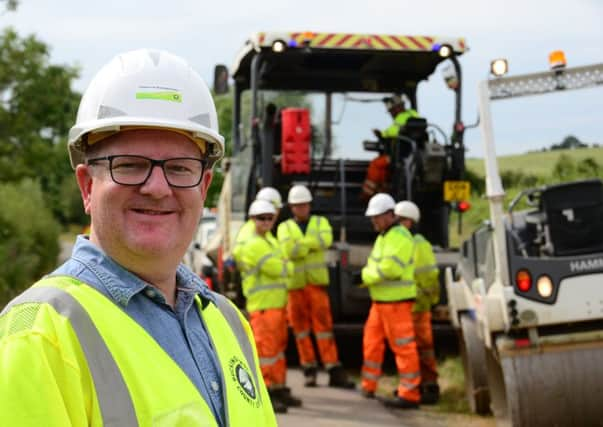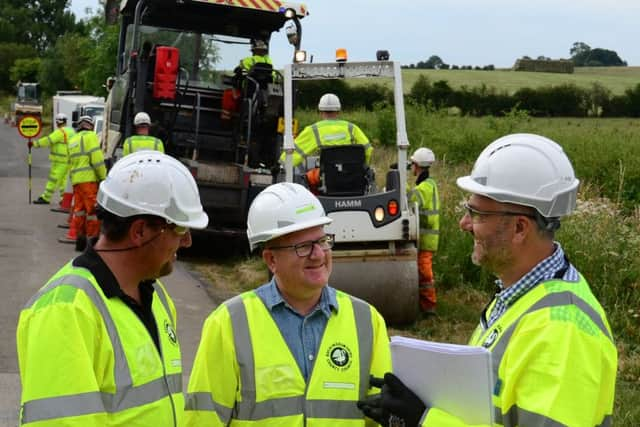£4.5m repair of Stoke Hammond and Western Linslade Bypasses will be eight weeks of '˜pain' for motorists


The £4.5 million investment in renewing the five-mile dual carriageway surface will take around eight weeks.
The work involves removing the entire surface course, which has a number of surface defects, and, in areas where investigations have found structural weakness, replacing some of the lower layers.


Advertisement
Hide AdAdvertisement
Hide AdCllr Mark Shaw, Bucks County Council Deputy Leader and Transport Cabinet Member, said: “Spending £4.5m on resurfacing the Stoke Hammond and Western Linslade Bypasses is another example of our commitment to invest in Buckinghamshire’s roads. This year we’re investing almost £25m in improving our roads.”
Up to three resurfacing teams will work at various points along the route. Each carriageway will close completely for around four weeks - starting with the Milton Keynes-bound lanes - to enable resurfacing of the road and roundabouts to be done more quickly. The Wing-bound carriageway will remain open until it’s resurfaced in September.
During closures, work teams will take the opportunity to do normal maintenance work.
Cllr Shaw said the decision to opt for alternate full carriageway closures gave contractors a clear run along the five-mile length, to get the job done more quickly, to better control costs, and to maintain road safety for motorists.
Advertisement
Hide AdAdvertisement
Hide AdSigns go out from today (Monday 23 July) to alert motorists to the work and diversions.
Traffic from the Aylesbury direction on the A418 will divert from the A4146 roundabout at the Wing end, via the Leighton Buzzard bypass, A505, and A5 to meet the A4146 again at Kelly’s Kitchen roundabout just outside Bletchley.
Traffic from the Milton Keynes and Bletchley directions will divert on to the A5 at Kelly’s Kitchen roundabout, via the A505 and Leighton Buzzard bypass to join the A418 at the roundabout near Wing.
“I appreciate that road works aren’t possible without some degree of inconvenience, and I apologise in advance for this,” said Cllr Shaw. “While we anticipate these diversions will deal with most traffic, I’ve no doubt drivers with local knowledge will find their own way. However, we’ve got open ears, and we’ll always listen to affected parishes to see how we can help tackle any local issues.
Advertisement
Hide AdAdvertisement
Hide Ad“I believe this comparatively short burst of pain will be worth it for the many years of ‘gain’, and we’ll have a very good bypass road surface once again.”
During the eight-week project the 60-strong work teams will lay about 25,000 tonnes of surfacing material over 140,000 square metres of road - the equivalent area of 13 football pitches.
The work will be done by Eurovia Surfacing, and Transport for Buckinghamshire will oversee the project.
Updated information, along with detail of the works schedule, will be published on the road improvements page of the County Council website: https://www.buckscc.gov.uk/services/transport-and-roads/improvement-schemes-and-projects/
Advertisement
Hide AdAdvertisement
Hide Ad> The bypass was opened up to drivers in September 2007 but ever since the dual carriageway has been beset with large cracks and potholes.
Tests carried out along the bypass to measure its thickness and ‘give’ established that construction materials used were correct and compliant with national specifications in force at the time.
However, analysis has shown the surface course was more porous than expected and water penetration into the layer beneath reduced the stiffness of the asphalt.
The new surface, hot rolled asphalt, will seal the structure of the road and allow the course below the surface to fully dry, thereby restoring the stiffness of the road, and extending its useful life.
Advertisement
Hide AdAdvertisement
Hide AdThe county council and Carillion – the successor to Alfred McAlpine, who built the road – were working together up to the time they went into receivership, to identify a solution to the deteriorating road surface.
At the time it was anticipated they would have been liable for a proportion of the cost of the works, however, the county council feels the cost of pursuing a legal claim would not be a sensible use of taxpayers’ money in view of the very slim chances of recovery owing to their limited assets.